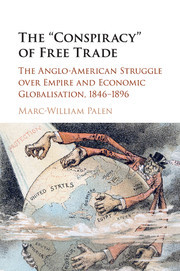The 'Conspiracy' of Free Trade The Anglo-American Struggle over Empire and Economic Globalisation, 1846–1896
Langue : Anglais
Auteur : Palen Marc-William

This book explores the controversial Anglo-American struggle over empire and economic globalization in the mid- to late-nineteenth century.
Following the Second World War, the United States would become the leading 'neoliberal' proponent of international trade liberalization. Yet for nearly a century before, American foreign trade policy was dominated by extreme economic nationalism. What brought about this pronounced ideological, political, and economic about-face? How did it affect Anglo-American imperialism? What were the repercussions for the global capitalist order? In answering these questions, The 'Conspiracy' of Free Trade offers the first detailed account of the controversial Anglo-American struggle over empire and economic globalization in the mid- to late-nineteenth century. The book reinterprets Anglo-American imperialism through the global interplay between Victorian free-trade cosmopolitanism and economic nationalism, uncovering how imperial expansion and economic integration were mired in political and ideological conflict. Beginning in the 1840s, this conspiratorial struggle over political economy would rip apart the Republican Party, reshape the Democratic Party, and redirect Anglo-American imperial expansion for decades to come.
1. Globalizing ideologies: economic nationalism and free-trade cosmopolitanism, c.1846–60; 2. 'The most successful lie in history': the Morrill Tariff and the Confederacy's free-trade diplomacy; 3. Mobilizing free trade: the postbellum free-trade movement, foreign policy, and 'conspiracy', 1866–71; 4. Fighting over free trade: party realignment and the imperialism of economic nationalism, 1872–84; 5. The great debate: the first Cleveland presidency, free-trade culture, and the anti-imperialism of free trade, 1885–9; 6. The cosmopolitan demand for North American commercial union, 1885–9; 7. 'A sea of fire': the McKinley Tariff and the imperialism of economic nationalism, 1889–93; 8. Free trade in retreat: the global impact of the McKinley Tariff upon the British Empire, 1890–4; 9. Republican rapprochement: Cleveland's free traders, Anglo-American relations, and the 1896 presidential elections; Conclusion; Select bibliography; Index.
Marc-William Palen is a historian of empires and globalization at the University of Exeter, and a Research Associate in US Foreign Policy at the US Studies Centre, University of Sydney. Other publications include articles in Diplomatic History, the Journal of Imperial and Commonwealth History, the Historical Journal, Civil War History, the Journal of the History of Economic Thought, and the Journal of the Civil War Era. He is the editor of the popular blog Imperial and Global Forum. He teaches courses on the British and American empires, focusing on the imperial roots of modern globalization. He has been awarded fellowships from the Society for Historians of American Foreign Relations, the US Studies Centre at the University of Sydney, the History of Economics Society, Smith College, Massachusetts, the Historical Society of Pennsylvania, the Massachusetts Historical Society, the New York Public Library, and the Government of Canada.
Date de parution : 05-2017
Ouvrage de 333 p.
15.3x23 cm
Disponible chez l'éditeur (délai d'approvisionnement : 14 jours).
Prix indicatif 45,81 €
Ajouter au panierDate de parution : 02-2016
Ouvrage de 334 p.
15.6x23.7 cm
Disponible chez l'éditeur (délai d'approvisionnement : 14 jours).
Prix indicatif 104,06 €
Ajouter au panierThème de The 'Conspiracy' of Free Trade :
© 2024 LAVOISIER S.A.S.
